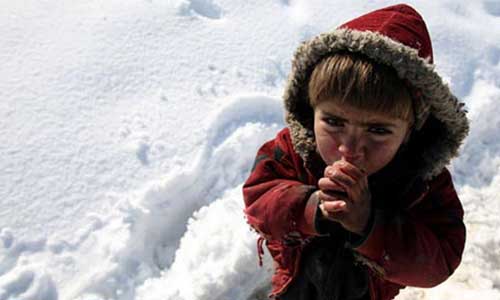In recent days the local media news quoted from Afghanistan National Disaster Management Authority (ANDMA) that the upcoming winter could be the coldest in the past 100 years. Based on professional reports, the snowfall regime has changed due to climate change and so it has started a month earlier compared to previous years. The capital city of the country and a number of other provinces has already witnessed heavy snowfall while we are in the second month of the autumn season yet. The local media quoted from Ministry of State for Disaster Management that 25 provinces are facing threats from natural disasters related to snow and rain in the coming winter. These provinces are consists of Daikundi, Ghor, Nuristan, Badakhshan, Parwan, Badghis, Jawzjan, Kunduz, Baghlan, Samangan, Sar-e-Pul, Takhar, Faryab, Uruzgan, Herat, Ghazni, Panjshir, Paktia, Khost, Maidan Wardak, Paktika and Logar provinces while Daikundi, Ghor, Nuristan, Badakhshan, Parwan, Badghis and Jawzjan provinces are among the provinces that are under high threat. Similarly, Nuristan, Kunduz, Baghlan, Samangan, Sar-e-Pul, Takhar, Faryab, Uruzgan, Herat, Ghazni and Panjshir provinces are in the next threat categories.
The life threatening winter with new waves of challenges are on the way while Afghanistan has already faced with dire social, economic and political crises. Defenseless people could lose their lives to the harsh winter and their children could trigger into extreme situations. Prior to this, lockdown measures imposed to fight the wild spread of coronavirus, between March and end of May, have led to the worsening of an already desperate food security. Small scale income-generating activities were most shut down – caused to diminish savings, impacting the ability to buy food and the daily wagers have economically hit miserably. However, the Afghans are back at work after the lockdown, but the fallout from not saving for months is huge. Moreover day-to-day expenses were, and still are, affecting the people. With premature winter, putting food on the table is getting harder. The government should worry about this. People can go to any extent when there is not enough food to go around, and see their children crying of starvation.
The bitterly cold winter and natural disaster threat in 25 province out 34 province can be more dreadful when imagine with the widespread production of pollution. The fight against environmental pollution is as much important as to fight against terrorism! every year, thousands of people, especially vulnerable ones are died due to this issue.The most vulnerable groups of people who are victimized by pollution are children who easily developed chest infection while the children belong to poor families are more vulnerable than others, especially those who need to collect garbage from dump yards for cooking and heating households. According to health experts, they will have smaller lungs, unhealthy brain and will be more vulnerable to respiratory and heart diseases in their later years. So, if we ignore such issues now, it will act as a health time-bomb for the future, guaranteeing that hospital wards will overflow of wheezing people with hearts and lungs permanently damaged just by living in cities. The vast costs to the economy of caring for an increasingly infirm older population will have to be met later.
Accordingly, the fearful winter will be more fearful when the mentioned issues are combined absolute poverty and covid-19 pandemic in the freezing winter. Misfortunately, covid-19 is steadily growing in the country. Yesterday, the ministry of health officials reported 205 new cases and 12 deaths recorded within 24 hours. Reportedly, out of these, 59 new positive cases were registered in Herat, 27 in Nangarhar, 18 in Kabul, 18 in Kapisa, 17 in Badakhshan, 14 in Balkh, 10 in Ghazni, 10 in Zabul, nine in Bamyan, seven in Kunduz, four in Kandahar, three in Helmand, two in Nimroz, two in Badghis, two in Logar and one case each in Samangan, Ghor and Parwan provinces. The total recoveries exceeded to 35,090 and the deaths to 1,617 in the country since the outbreak of the pandemic started. However, there is no report from rural areas, accessing health facilities can be incredibly challenging there. These reports show that Afghanistan has recorded the highest increase in the number of corona-virus cases after release of the restrictions while the country has zero restrictions now and premature winter could also worsen the situation.
Regardless of all mentioned factors, only seven million people are at risk of natural disasters such as floods, landslides, snowstorms and earthquakes across the country as estimated by officials while there may not be enough budget to fight with the minimum. In fact, we need to seek help from international community because the government was already falling short from handling the previous problems such as corona-virus, extreme hunger, air-pollution and more importantly clean energy shortage such as gas and electricity which act as main factor for air-pollution in the country. However, the government is more responsible than anyone to wake up and see people’s situation from an open eye as a large number of people are going through huge difficulties from now on.
As the government institutions may not have enough facilities and budget to tackle with all of the problems we have to support it encouraging the people take some personal measures how to deal with the problems. In this regard, the public media can play important role. For example, the media introduce useful tips and professional awareness as personal strategy. If people decrease outdoor activities when there is air-pollution, use masks in the public places, keep social distance during social contacts, having proper healthy diet plan appropriate with the pandemic and pollution, heat houses with less expenses etc. this way a large part of the problems may be minimized.
Home » Opinion » Millions of people under winter threatening Issues in Afghanistan
Millions of people under winter threatening Issues in Afghanistan
| Mohammad Zahir Akbari

